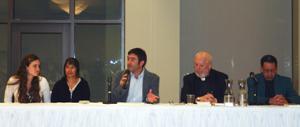
By Celine Klosterman
DAVENPORT — Nearly two years after an immigration raid in Postville, families and economies in the northeast Iowa town and in Guatemala continue to suffer.
About 430 people heard that message March 10 at St. Ambrose University, during a screening of the documentary “In the Shadow of the Raid” and discussion with filmmakers, Postville Hispanic ministers and a woman whose husband was deported after the raid.
The half-hour film took viewers to both Postville and Guatemala, a poor Central American country that was the native land of many of the nearly 400 undocumented workers arrested during a May 12, 2008, raid at a kosher meatpacking plant. Amid makeshift shacks in Guatemalan villages, tearful men and women described the devastation that losing income from relatives working in Postville had caused.
“Now who will help me?” cried one woman, who relied on her daughter in Iowa to send money for medicine and food.
One man described fear of losing his home, which he had used as collateral for a loan to fund his sons’ journey to the United States. Without his sons’ financial help, he couldn’t afford to pay interest on the loan with his daily wages of $6.
In Postville, filmmakers Jennifer Szymaszek and Greg Brosnan highlighted women bringing home boxes of cereal from food pantries and voicing embarrassment at having to live off charity after the raid at Agriprocessors. Food pantry workers spoke of increased strain on the service, while store owners described how business has suffered. “When the plant got shut down, our whole economy went downhill,” one woman said.
The raid took an emotional toll on Postville residents, too. Rosa Zamora, who was featured in the documentary, was left to care for two young daughters after her husband was deported. Sometimes, her children ask where their father is, she told the audience during a panel discussion after the film. Answering them is hard, she said through a translator, tearing up.
Zamora is working toward getting a U-visa that would give her temporary legal status and eligibility to work in the United States. Then, her husband may be allowed to return, said Paul Rael, Hispanic ministry coordinator at St. Bridget Catholic Church in Postville.
“Sometimes I ask why people treat us as criminals,” Zamora said. “We’re just coming here to work.”
She voiced hope that President Barack Obama would give people like her an opportunity to stay in the United States. In Guatemala, her husband hasn’t been able to find work for a year, she said. “There is much need there.”
Visibly angry, Rael said the U.S. government bears responsibility for causing that need. What audience members saw in the film is connected to the 1954 Guatemalan political coup organized by the U.S. Central Intelligence Agency, he said. The U.S. “wanted to control Central America during the Cold War.”
He also blamed trade policies such as the North American Free Trade Agreement for hurting small, individual farmers by pitting them against corporate farms. “How can they compete?”
Father Paul Ouderkirk, retired pastor of St. Bridget Parish, recalled memories from the days immediately following the massive arrests of Postville workers. He’d been through two raids previously, but neither compared to the size of Postville’s, he said. Out of town during the raid, he returned to St. Bridget’s to find the church packed full of shaken immigrants. “Sixty to 70 percent of them were crying.”
Since then, “we’ve lost a third of the school, a sixth of the town, and half of the parish,” he said. “…We thought we’d recover by now, but we haven’t.”
Rael suggested audience members contact their U.S. senators and representative to voice support for immigration reform. “This nation has gone on way too long being a silent majority.”
Davenport Diocese representatives distributed immigration reform postcards to the event’s attendees to send to members of Congress.








